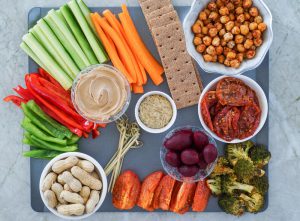During a typical 12-hour shift, a nurse can easily walk 4-5 miles, about 8,400-10,500 steps. (A study by University of Iowa found that most people take about 2,100 steps to walk a mile.) Compare this to the average American daily count of 5,000-7,000 steps.
When you consider the bending, reaching, and lifting necessary during a shift, it’s easy to see that the physical demands of a nurse can compare to that of an athlete in training. Now add in the constant mental focus and concentration required for providing safe and excellent patient care, and you can understand the obvious need for high-quality nutrition for optimal performance.
First… Breakfast
No matter what time your shift starts, don’t neglect to eat some form of “breakfast,” the first meal of your day after you wake up. You already know this, probably going back to childhood and your mother’s insistence. Yet it’s easy to try and grab a few more minutes of sleep, gulp down your favorite form of caffeine, and promise yourself that you’ll find healthy food during the day. Don’t do it.
You owe it to yourself—and your patients—to be properly fueled for the next 12 hours. Besides being the launching point of your day, there are some impressive benefits:
- Glycogen levels are restored after sleep, so the body doesn’t have to break down fatty acids for energy. Since fatty acids are only partially oxidized, energy levels are decreased.
- Metabolism gets a jump-start when you eat breakfast, so more calories are burned throughout the day. Your body doesn’t try to conserve calorie expenditure.
- Breakfast eaters are less likely to have overweight or obesity. Research suggests that regular glucose levels help control the appetite.
- Skipping breakfast is related to a higher risk of type 2 diabetes and cardiovascular disease, possibly because of lower intake of fiber, vitamins, and minerals.
- Brain function (concentration and memory) improves; the brain relies solely on glucose, so a constant supply is essential.
- People who eat breakfast tend to eat less unhealthy fat during the day and make overall better food choices.
Eating for Endurance
Twelve hours is a long time, especially when you spend most of the time on your feet and moving. To successfully fuel your body for half-day of activity, you’ll need a strategy.
- Plan on at least one meal and two snacks. Eat a snack several hours after the start of your shift, a meal about halfway through, and the second snack two hours before the shift ends.
- Drink caffeine wisely. Enjoy a cup of coffee or tea when you wake up or before your shift and during the first 4-6 hours of work; research shows this can improve alertness and concentration. If you begin to feel jittery, stop. Avoid caffeine during the last half of the shift so your sleep won’t be disrupted.
- Be cautious when using energy drinks, such as Red Bull or Rockstar. Many energy drinks have sugar along with high doses of caffeine. Additives, such as vitamins or herbal supplements, aren’t proven to be beneficial and are not FDA-regulated.
- Say “no” to sugar. It’s nearly impossible to resist when there’s a birthday cake or holiday cookies, but regularly relying on sugar to cause momentum doesn’t work. The blood sugar spike is always followed by a crash—and it affects your health.
- Hydrate, hydrate, hydrate. Proper fluid intake (water or liquids with no sugar, caffeine, or artificial sweeteners) contributes to a steady energy level. Nurses are notorious for avoiding liquids to limit trips to the toilet but you should monitor your output as closely as you would for a patient.
- Eat smaller portions. When you eat a large meal, your body diverts energy to digest big meals, causing postprandial somnolence. Go for a balance of protein, fiber, and healthy fats to avoid the “afternoon dip” or “3 a.m. dip.”
Eating for Focus and Mood
There’s no way to sugarcoat it: Nursing can be stressful. As your stress level increases, so does the hormone cortisol. Cortisol triggers glucose to be released into the bloodstream, causing headaches, irritability, anxiety, and decreased concentration. It can cause you feel unusually hungry, leading to weight gain. It can even affect your quality of sleep and immune system.
While it’s tempting to reach for “comfort” foods or snacks during hectic or stressful times, resist the temptation. Eating a donut or bag of spicy tortilla chips is not going to improve your mood.
- Antioxidants remove free radicals and act as roadblocks on the “stress expressways,” suppressing inflammation and boosting mental function. They’re easily found in leafy green vegetables, avocados, fruits, beans, and nuts.
- Complex carbohydrates, such as oatmeal, whole-grain foods, vegetables, potatoes, fruits, and brown rice.
- Research shows that magnesium and zinc play important roles in how we handle stressful situations. Fortunately, you’ll find both in the foods that support both mood and endurance, as well as lean beef and eggs.
- Up to 95% of the body’s serotonin (the “feel good” hormone, also associated with focus and calmness) is produced in the gut, so be sure to eat probiotic-rich foods such as pickles, sauerkraut, and kefir. Foods with tryptophan (necessary to produce serotonin) are also helpful, including salmon, eggs, cheese, turkey and tofu.
- Don’t skip meals. This creates the dangerous cycle of low blood glucose→hunger→poor food choices→low blood glucose…and so on.
- Besides food, remember social connections, laughter, exercise, sunlight, relaxation techniques, vacations, and adequate sleep are also necessary for good mental health.
Choosing Foods for Your Marathon Shift
Just as when you carefully plan patient care for your shift, give yourself the same consideration when you plan for your nutrition. You’re not only looking ahead for the next 12 hours, you’re also looking ahead for the next 12 years…or longer.
Use this table to help identify foods that include the elements you need to be an energetic, focused nurse during your 12-hours shifts—or any other time.
| Food | Examples | Nutrients |
|---|---|---|
| Green leafy vegetables | Broccoli, cabbage, collard greens, kale, spinach | Antioxidants, vitamins A, C, K,electrolytes, complex carbs, fiber |
| Beans & Legumes | Chickpeas, lentils, peas, kidney beans, black beans, navy beans, pinto beans, soybeans, peanuts | Vegetarian protein, complex carbs, vitamins, minerals, iron, fiber |
| Complex carbohydrates | Whole grains, beans, lentils, starchy vegetables, fruits | Vegetarian protein, starch, vitamins, minerals, antioxidants, fiber |
| Proteins | Fish, poultry, lean beef and pork, soy, eggs, dairy, nuts, beans, legumes, whole grains | Amino acids, B vitamins, vitamin E, iron, zinc, magnesium |
| Healthy fats | Avocados, dark chocolate, eggs, fatty fish, nuts, peanuts, seeds | Omega-3, omega-6, vitamin E |
| Fiber | Beans, broccoli, cabbage, cauliflower, kale, avocados, potatoes, whole grains, apples, berries, nuts | Varies by food, see above |
| Probiotics | Yogurt, buttermilk, sauerkraut, miso, tempeh, kefir, kimchi, kombucha, pickles, supplements | Live micro-organisms |
| Water/Fluids | Water, juice, milk, non-caffeinated beverages | Varies by fluid: fluoride, calcium, vitamins, iron, electrolytes may be components |
Planning and Packing Food for Your Shift
This is the tough part: Deciding what to bring and then finding time to prepare it for work. Knowing you should do it is one thing, but “shopping and chopping” means extra time and effort. You likely have other obligations: childcare, parents or family, classes for your next degree or certification, household chores, carpools, holidays and celebrations…the list is endless.
Please remember that you can’t take care of others if you don’t take care of yourself first. And that includes bypassing the fried special in the cafeteria and bringing the food that will keep you healthy and focused for whatever the shift brings.
Preparation doesn’t have to be complicated. You can find plenty of healthy options at your local grocery store. Follow these useful tips from other nurses and dieticians:
- Hard boil a dozen eggs and bring a couple to work. Only 78 calories each, they’re a quick source of protein and nutrients.
- Trail mix satisfies that salt-and-sweet craving, while delivering protein, fat, and fiber. Of course, it would be great to make your own, but who has time? Big box stores and grocery stores sell snack-size packets.
- Greek yogurt is nearly perfect. It has protein, fat, live cultures, vitamins, and minerals. Cottage cheese is also a good choice, with a little more protein.
- Cheese, in small quantities, provides protein, calcium, and helps reduce hunger pangs. Aged cheese (cheddar, Gouda) helps break down food, synthesize vitamins, and bolsters immunity. An ounce of cheese is about the size of your outstretched thumb.
- Apples have 4 grams of fiber—and a long shelf life. Pair one with some peanut butter or an ounce of cheese, and you’re ready to keep going.
- Bananas contain an amino acid that helps create norepinephrine for alertness. Easy to pack and eat. Add peanut butter to these, too.
- Sweet potatoes are good any time of the day. Poke it with a fork, wrap it in a paper towel and microwave 5-7 minutes. Add a little butter and cinnamon for breakfast or a slice of ham for a meal.
- Turkey is a smart go-to. This lean deli meat has 9 grams of protein and sets up the gut to produce serotonin. Wrap it around a piece of string cheese for a boost.
- Tuna in a small can provides up to 25 grams of protein, plus healthy fats. Affordable, packable, and low in calories. Easy eating with whole-grain crackers. Include some celery and carrots sticks for fiber.
- Dark chocolate (over 70% cocoa) has the least sugar, plus a little caffeine to give you a kick. It also contains minerals, flavanols, and antioxidants. The only downside is that you’re limited to 1-2 ounces (30-60 grams).
Enjoy the Special Times!
One of the enjoyable things about working on a hospital unit is participating in celebrations and holidays. It’s fun to share dishes at a potluck or to bring in baked goods for birthdays or a special occasion. Holidays mean delicious traditional treats—and they’re usually not the healthy kind.
When you’re eating properly, of course you should enjoy special times with your co-workers! A few cookies or scoops of a “Grandma’s famous casserole” won’t destroy your health. And the camaraderie or holiday spirit is worth it. Tomorrow you can return to your usual diet—but for today, dig in!
 By
By 



